Iran Says Exports Of Steel, Metals Have Increased This Year
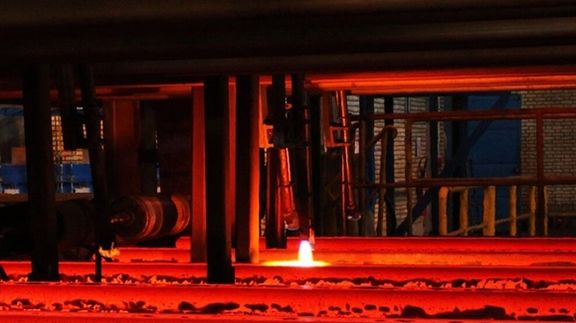
Iran’s customs department says exports of steel and metals have increased this year compared with last year, reaching $4.5 billion, amid US sanctions on Iran.

Iran’s customs department says exports of steel and metals have increased this year compared with last year, reaching $4.5 billion, amid US sanctions on Iran.
The spokesman of the Customs Organization, Ruhollah Latifi, told local media that in the first 8 months of the current Iranian calendar year exports have already topped all last year’s sales by $800 million.
Latifi announced that that exports of steel, iron, iron ore and construction steel constitute 14 percent of all exports that total $31 billion, in the eight-month period. Exports of metal products and iron ore last year was $3.7 billion, he said.
The World Steel Association last month said that Iran’s production fell by 15 percent in October, following smaller declines earlier this year. The declines were due to shortages of electricity.
Iran has been suffering from an power shortages in recent years as its natural gas production, feeding power plants, fails to keep up with domestic demand. Lack of investments and technology resulting from years of various sanctions have gradually reduced output in operating gas fields.
Export of non-oil products has become more important for Iran as US sanctions have reduced oil exports its main revenue-generating commodity.
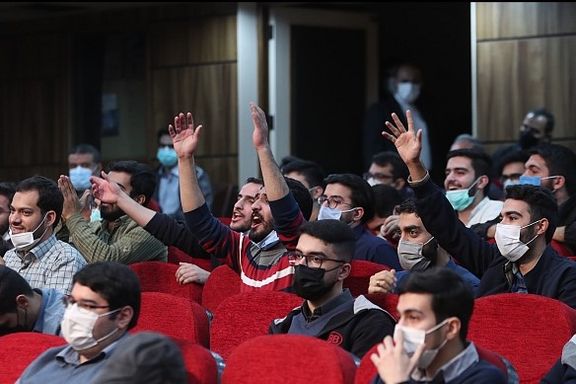
An Islamist student on Tuesday harshly attacked President Ebrahim Raisi and the ruling elite during a public meeting in Tehran’s Sharif University of Technology.
Raisi who visited the university to mark the annual student day, was peppered with attacks by the Secretary of the university’s Islamic Student Union. The group is present on all campuses and is a state-sanctioned organization whose members belong to the Basij paramilitary wing of the Revolutionary Guards.
The remarks of the student leader, Mohammad Hossein Bayat are stunning in their directness and degree of criticism. He told Raisi that “You got elected in the least competitive election in the history of the Islamic Republic, with the lowest rate of voter participation.” He added, “We are speaking to you not as a president elected with the free vote of the people in a free election. We are speaking to you as a representative of the ruling system.”
Raisi’s key rivals were barred from running in the June election by a watchdog council controlled by Supreme Leader Ali Khamenei, that ensured his victory among less popular candidates.
Bayat, addressing Raisi said that he represents a ruling system which “in the past 40 years has not opened a path for the progress of the people, despite the revolutionary ideals of freedom and justice.” But what the student leader said next was even more stunning. He told Raisi that the Islamic Republic not only has failed to serve the people, but it has “drowned itself in various crises and super crises and except some brief periods, it has not seen stability and calm.”
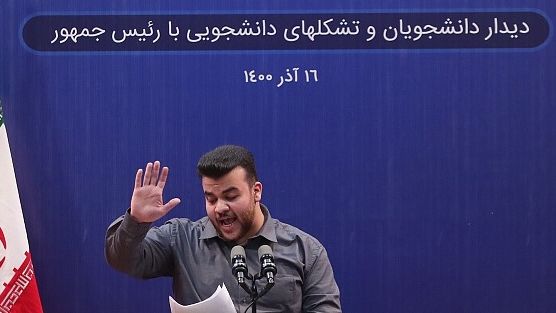
These remarks implicitly pointed to the Islamic Republic’s confrontational foreign policy among other issues, such as an inefficient economic system, persecution of dissidents, lack of transparency and disastrous environmental policies.
Bayat then reminded the president that he is the product of the least competitive election, organized by an “incapable and ineffective political system” which has pushed the people into “hopelessness about any change or improvement” in Iran.
He went on to accuse Raisi of stacking his administration with corrupt cliques, and he openly named the president’s top aides. Bayat also said that the current administration is the most militarized government in the history of the Islamic Republic, dividing critical posts among the Revolutionary Guard brass.
Iranian presidents have often met tough critics whenever they visited universities. But dissident students have been intimidated into silence and the Islamic Student Associations are controlled by elements who are supposed to be loyal to the Islamic Republic. Bayat’s harsh remarks should be seen in this context.
Bayat told Raisi to tell his friends that there is no glory in zero percent economic growth, political isolation, lack of transparency and all other policies that impose an “exorbitant cost on the Iranian nation.”
He continued to mention more than a dozen crises in the country, above all corruption of the “political-military elite” and the suppression of the people who are hopeless and fed up with their economic plight. In a situation where all civil society has been demolished and activists are in prison, Bayat asked Raisi, what other alternative exists except violence and protest. He added that the ruling elite has basically decided it does not want to listen to the people as long as it can fire guns to protect itself.
In the end of his remarks Bayat warned Raisi that if a rational way out of the current crises-ridden situation is not found, the ruling elite will receive “an answer from the people that might not come immediately…but will definitely be revolutionary and decisive.”
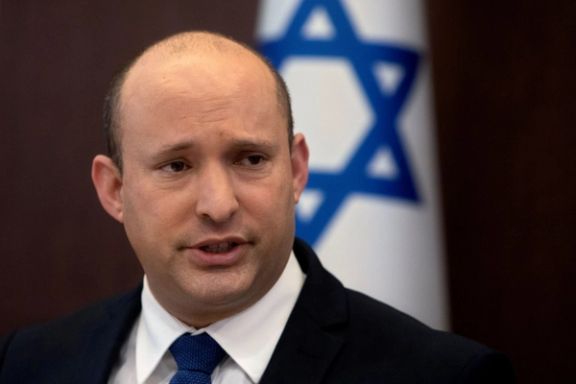
Israeli Prime Minister Naftali Bennett on Tuesday vowed that Israel would continue to push back against what he called "destructive forces" in the region.
Bennett was speaking during a meeting with the leaders of Cyprus and Greece.
His comments came as Syrian state media reported that Israeli warplanes fired missiles at the port of Latakia earlier in the day.
Israel has attacked hundreds of Iran-related military bases and positions in Syria since 2017, but the port of Latakia is not a usual target.
Syria's state media quoted an unnamed military official as saying that several missiles struck the containers area in the port, setting some of them on fire.
The Britain-based Syrian Observatory for Human Rights, an opposition war monitoring group, said the airstrike hit arms shipments for fighters loyal to Iran.
There was no comment from the Israeli military.
Israel has previously acknowledged, however, that it targets the bases of Iran-allied militias, such as Lebanon's militant Hezbollah group that has fighters deployed in Syria.
It says it attacks arms shipments believed to be bound for the militias.
Report by AP
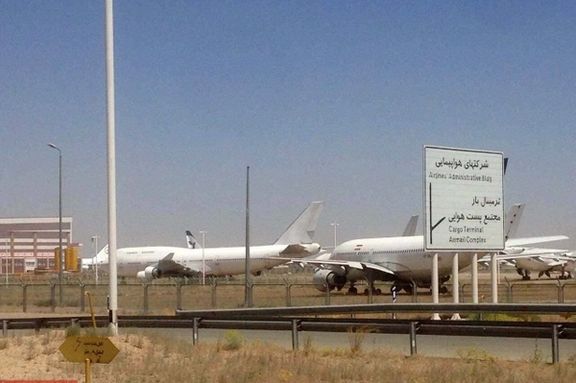
More than 50 percent of Iran’s passenger planes are idle due to lack of spare parts, particularly engines, a trade representative told local media on Monday.
In an interview with state-controlled media, Alireza Barkhor, deputy chairman of the Association of Iranian Airlines asked for government assistance to airlines for repairing and procuring spare parts. He said that lack of money and sanctions have prevented essential maintenance and repair work on Iran’s aging fleet.
Barkhor is a former air force captain appointed to civilian government positions, according to common practice by the Islamic Republic.
“Currently, more than 170 planes are grounded for lack of financial resources and restrictions due to sanctions,” Barkhor said and added that if this trend continues, more planes will become non-operational in the near future.
The United States banned the sale of aircraft and parts to Iran in 1995, and because most passenger planes are manufactures by outsourcing parts to hundreds of companies, the sanction practically makes it impossible for most manufacturers to sell parts.
In addition to the ban on aircraft sales, the US also reimposed banking sanctions on Iran in 2018 that would penalize any financial institution or bank for dealing with Iran. Therefore, payments to established aviation companies become out of question.
Iran suffered from shortages of civilian airliners since the 1990s and used a variety of ways to lease older Russian planes or buy spare parts through intermediaries, but the technical state of its fleet was deteriorating, before a brief reprieve.
When the 2015 nuclear agreement, JCPOA, went into effect sanctions on purchases of Western aircraft were lifted and Iran began talks to buy aircraft from Boeing and Airbus. A few airbus planes were delivered but the newly elected Trump administration never approved sale of US planes until Washington withdrew from the JCPOA in May 2018 and reimposed sanctions.
Earlier this year, Barkhor had said that Iranian airlines are on the verge of bankruptcy, confirming that the government’s flagship Iran Air had $800 million in debt. He had also said that without piecemeal government help these companies would have already gone bankruptcy.
In September, an aide to President Ebrahim Raisi promised assistance to Iran Air but so far nothing has materialized. The government is under tremendous financial pressures and Iran’s currency, rial, has fallen 25 percent since Raisi took office in August.
Everything hinges on Iran’s negotiations with the United States over restoring the JCPOA and lifting sanctions. The Raisi government, however, has toughened Tehran’s posture in the talks and a round of negotiations in Vienna last week ended without success. Diplomats and observers are pessimistic over the talks.
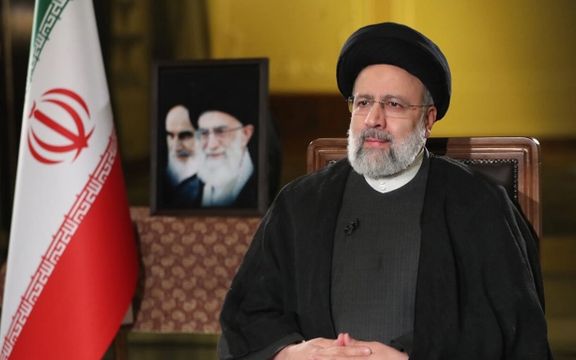
Media in Iran have criticized President Ebrahim Raisi for evading significant questions during his recent televised, including on the issue of nuclear talks.
The much-advertised interview broadcast by Channel One of the state-run television in a prime time slot had nothing new and concrete to offer, critics of the hardline president say. They allege that the interview was held in a highly controlled "green-house environment", questions were dictated by the interviewee, and it was a "monologue" and propaganda event rather than a real, challenging interview.
"Green-house interviews may shield the President from the harms of exposure to the media sun, rain, and wind. But this makes him equally vulnerable as he may catch a cold even if a small media breeze suddenly gets through a window!" Reformist Etemad daily wrote Tuesday.
The conservative Jomhouri Eslami newspaper also warned that officials of the Islamic Republic will never be able to convince the public as long as they avoid interviews with free and independent journalists.
The hardliner media affiliated with the Revolutionary Guard and ruling circles have stayed mostly silent about the TV program.
Many have also pointed out that the interviewer repeatedly sang praises of the Raisi administration and its "achievements" while posing his questions. "Niceties [by the presenter] were so exaggerated that it appeared as if an employee is paying lip service to his employer," conservative Asr-e Iran website charged in a commentary Monday entitled "This Is Not an Interview, It's a PR Talk Between Boss and Civil Servant".
The presenter only asked about the nuclear talks in Vienna towards the end of the one-hour talk, to which Raisi gave a very general and short answer.
He avoided referring to the revival of the 2015 nuclear deal, Joint Comprehensive Plan of Action (JCPOA) and only talked about the importance of "lifting of sanctions", a matter of great importance to the Iranian economy, which nevertheless needs an agreement with the United States.
The conservative Jomhouri Eslami newspaper and some other media outlets have also criticized the president for offering completely irrelevant answers to some pre-determined questions.
Raisi told his audience there was no money in the government's coffers when it was handed over to him and claimed that notwithstanding the fact, his administration managed to pay civil servants' salaries without borrowing from the Central Bank. When asked how the government managed this, he responded that the government must harness tax evasion and sell government assets such as real estate that are not in active use.
"The presenter had not asked about your plans to secure budgetary resources, he was asking how this could happen in the three months [since you took office]," Asr-e Iran website asked in another commentary Monday entitled "What Was Raisi's Response to the Most Important Question?"
In fact, Iran’s former central bank chief Abdolnasser Hemmati said after Raisi’s TV talk, that the government has simply borrowed for state and quasi-state banks and they in turn borrowed money from the central bank. He said this is tantamount to printing more money, which the new government has pledged not to do.
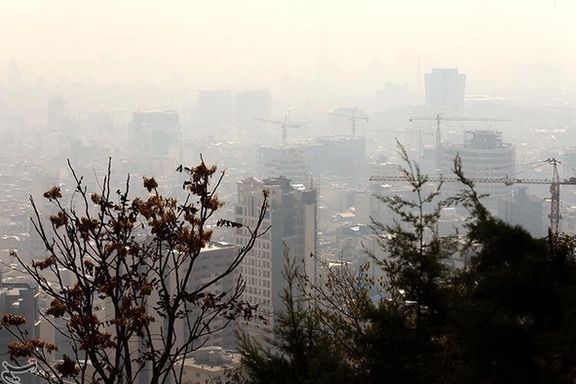
Authorities in Iran’s capital Tehran and suburbs will close educational institutions two days a week as air pollution has reached a dangerous level in winter.
Tehran province governor’s office announced on Tuesday that measures were necessary to reduce pollution and protect citizens by closing all educational institutions and limiting commercial activities on Wednesdays and Thursdays each week.
Air pollution is a persistent problem in large Iranian cities, especially in cold and hot weather when more electricity is used and power stations resort to using heavy dirty diesel fuels because of natural gas shortages. Last winter, power plants had to be shut down prompting power cuts that led to some protests. The situation is expected to get worse in January and February.
Iran has the world’s second largest natural gas reserves, but consumption is much higher than in other countries while production remains flat due to lack of investment and new technologies.
Authorities have also banned operations of polluting industrial plants for two days a week and will clamp down on vehicles without a clean bill of health. Many private and large vehicles in Iran are old, using outdated technology as the government strictly limits imports of modern vehicles to support local manufacturing.